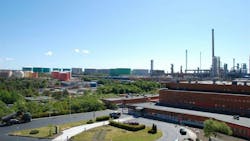Preem to boost renewable fuels production at Lysekil refinery
Swedish refiner Preem AB, a wholly owned subsidiary of Corral Petroleum Holdings AB (CPH), Stockholm, has let a contract to Topsoe AS to deliver technology for a project to reconfigure a conventional processing unit for production of renewable fuels at the operator’s 11.4-million tonne/year (tpy) refinery in Lysekil, Sweden.
As part of the Jan. 23 licensing and engineering agreement, Topsoe will provide its proprietary HydroFlex technology for the revamping of the refinery’s existing isocracking unit to enable production of 1.2 million cu m/year (22,000 b/d) of sustainable aviation fuel (SAF) and renewable diesel, the service provider said.
The converted unit is scheduled to begin producing SAF and renewable diesel in 2027 to support Preem’s 2035 targets for achieving both 5 million cu m/year in renewable fuels production and climate neutrality across the entire value chain, Topsoe and the operator said.
While Topsoe did not reveal a value of the contract, the award follows Preem’s late-2023 final investment decision (FID) to move forward with the Lysekil isocracker revamp (ICR) project at an estimated cost of 5.5 billion krona ($524.2 million), according to a Nov. 27, 2023, release from Preem.
Pending final environmental permitting from Sweden’s Land and Environmental Court due in late-spring 2024, Preem’s conversion plan for the isocracking unit—which currently produces diesel—is the second in a series of proposed large-scale projects designed to expand the operator’s 530,000-cu m/year total renewable production capacity of two refineries to 2.5 million cu m/year by 2027, followed by a subsequent doubling of capacity to reach the 2035 target, Preem said.
Already under way and confirmed by Preem in mid-March 2023 for anticipated startup in second-quarter 2024, the first of these projects entails the retrofitting of an existing Synsat hydrotreating plant at Lysekil to enable co-processing up to 40% renewable raw materials for production of renewable diesel, with a goal of increasing that rate in the future to further phase out processing of fossil-based feedstock by the plant (OGJ Online, Nov. 9, 2020).
Preem said Lysekil’s increased renewable production following commissioning of the Synsat and ICR revamp projects will play a central role in helping Sweden to achieve its climate targets, with the conversion projects estimated to reduce carbon dioxide (CO2) emissions throughout the value chain by 1.7 million tpy and 2.5 million tpy, respectively, with the ICR alone to reduce local CO2 emissions from the refinery by 200,000 tpy.
Alongside its transformation plan for Lysekil, Preem has also undertaken basic engineering and front-end engineering and design (FEED) studies for potential installation of a standalone plant dedicated to production of renewable fuels at the operator’s 6-million tpy refinery in Gothenburg, Sweden.
Known as Project Viking, the grassroots plant at Gothenburg would consist of a Topsoe-licensed Hydroflex unit, a hydrogen production unit, and renewable feedstock pretreatment unit that, combined, would enable the site to produce a combined 1 million cu m/year of SAF and renewable diesel, as well as result in a potential reduction of up to 2.5 million tpy in CO2 emissions, according to Preem.
In a November 2023 notice confirming its decision to proceed with proposed transformation work at Lysekil ahead of Gothenburg, Preem said construction of ICR and Project Viking would proceed sequentially than in parallel, with FID on Project Viking to occur at “the relevant point in time.”
Sustainable feedstocks to be processed for production of renewable fuels at the Lysekil and Gothenburg projects would include a mix of used cooking oil, waste tallow, and rapeseed oil, according to Preem’s website.
Potential divestment
Preem’s proposed transformations of its Lysekil and Gothenburg refineries come amid CPH’s initiation in fourth-quarter 2023 of a program aimed at evaluating strategic options to remain viable, which could include the potential sale of 100% interest in Preem and Preem Holdings AB, according to an Oct. 5, 2023, release.
With Preem deemed as critical infrastructure in Sweden under the country’s Protective Security Act, Preem and CPH said any potential sales transaction would be subject to review under the Swedish Foreign Direct (FDI) Investment Act that was to take effect on Dec. 1, 2023.
To date, further information regarding any potential sale has yet to be revealed by either Preem or CPH.
About the Author
Robert Brelsford
Downstream Editor
Robert Brelsford joined Oil & Gas Journal in October 2013 as downstream technology editor after 8 years as a crude oil price and news reporter on spot crude transactions at the US Gulf Coast, West Coast, Canadian, and Latin American markets. He holds a BA (2000) in English from Rice University and an MS (2003) in education and social policy from Northwestern University.

